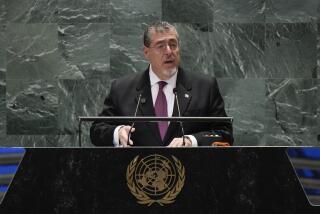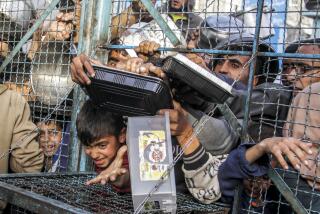Palestinians Feeling Money Squeeze
- Share via
CAIRO — Palestinians have gathered only about half the money needed over the next six months to field a police force in Jericho and Gaza Strip, the single most important element in asserting Palestinian power under the new autonomy plan, officials said Thursday.
Aid coordinators meeting here said they had amassed about $20 million of the estimated $90 million a year needed to operate the 9,000-member force. That immediately raised questions about how the Palestinians will sustain the institution responsible for guaranteeing order and security in the turbulent months ahead.
Terje Larsen, the Norwegian diplomat heading the fund-raising effort, said the contributions collected so far, along with donations of equipment and materiel, “are about to reach a level where at least the minimum requirements are met.”
He said the 50% available now compares favorably to late March, when 10% of the first six months’ operation costs had been pledged.
But privately, diplomats and Palestine Liberation Organization officials are alarmed at the slow fund raising, particularly for deployment of Palestinian police who will require housing, weapons and communications equipment if the newly signed Palestinian autonomy agreement with Israel is to succeed.
“They need the money, they need it now, and they don’t have all they need,” a Western diplomat said.
While the PLO has sent envoys to capitals around the world seeking donations to cover the $13.4 billion it says it will need to fund the first five years of autonomy, pledges have been slow. Actual contributions have been almost nil in the weeks preceding the autonomy pact’s signing.
PLO officials say most nations indicated a willingness to help but were reluctant to commit cash before seeing if Israel and the PLO would reach their accord on Palestinian self-rule.
With the agreement signed Wednesday in Cairo, Thursday’s meeting to update donations for the police force indicated that the world even now is not rushing to finance even the most critical elements of the self-rule program.
“You’ve got to have an effective, well-trained police force on the ground as quickly as possible if you want this to work at all,” one diplomat said.
It is clear the police deployment will be slower than envisioned, though PLO officials blame that primarily on problems with logistics.
The first major influx of officers, instead of arriving Thursday as planned, will not be deployed until Monday--at the earliest.
Nabil Shaath, PLO chief negotiator, said it is taking longer than expected to get the Palestine Liberation Army forces from six Arab countries into a staging camp on the Egyptian border at Rafah for deployment as police in the Gaza Strip.
“At this stage of the game, the most urgent need is for cash that will go directly in smoothing the transition and making things happen fast, which is what we require,” Shaath said.
He said the PLO is emphasizing the need to equip the police force with modern communications and computer equipment in the belief that technology can help avoid the human rights abuses that occur in many underdeveloped countries.
To help spur fund raising, the United States announced that it was raising its $4-million pledge of aid to the police force by $5 million more, hoping other nations would follow. The U.S. aid will cover any needed start-up costs--except weapons.
The United States has also donated several hundred vehicles for the Palestinian force; they were being shipped into Gaza last week.
Other cash contributions include $2 million from Norway, $11 million from the European Union and an undisclosed amount from Japan.
Several nations have pledged equipment and in-kind support.
Saudi Arabia, for example, is donating flights to transport equipment, worth about $1 million. Russia has pledged armored vehicles, Germany a police academy building, Britain riot gear, and Norway will supply police uniforms.
In Israel on Thursday, Japanese Foreign Minister Koji Kakizawa outlined plans to provide $50 million for police housing and to train workers on modern construction equipment.
Japan overall is expected to give about $200 million in the next two years for housing, refugee aid and health facilities.
The World Bank last week announced a $1.2-billion program to create institutions and rebuild infrastructure in Gaza and Jericho, with $570 million available in the first year.
The program--for which the EU, the United States and Japan would be the biggest donors--includes about $300 million to support private-sector investment in housing, telecommunications, agriculture and industry.
Another $300 million will go toward building a central Palestinian administration.
More to Read
Sign up for Essential California
The most important California stories and recommendations in your inbox every morning.
You may occasionally receive promotional content from the Los Angeles Times.













